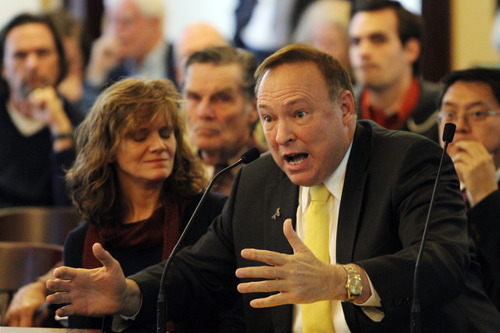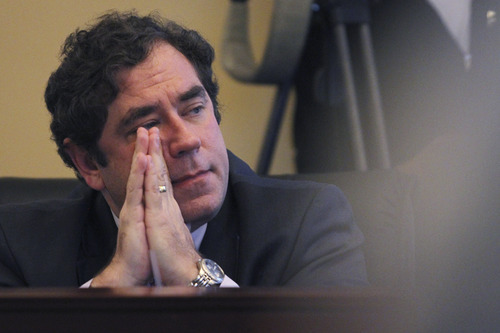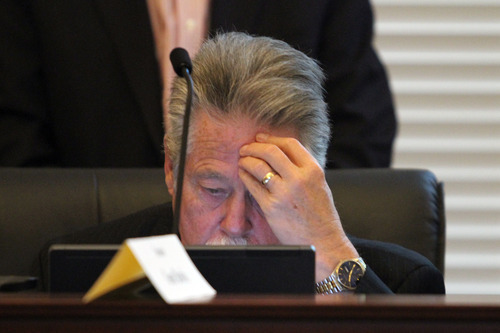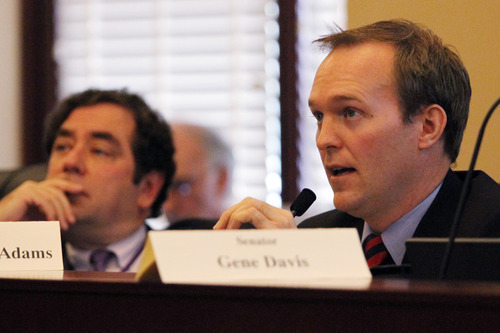This is an archived article that was published on sltrib.com in 2011, and information in the article may be outdated. It is provided only for personal research purposes and may not be reprinted.
Some legislators quietly asked their political party to use its voter database to analyze which proposed congressional district maps would best help its candidates. They also coordinated redistricting work with allies quietly behind closed doors.
While those sound a lot like Democratic charges against big-majority Republicans, this time the complaints are coming from the GOP — based on documents the party obtained through an open-records request.
"What I find troubling is the hypocrisy from the Democrats," said Utah Republican Party Chairman Thomas Wright. "Democrats said that [maneuvering for partisan advantage] was unethical and they wouldn't do that. And now we're seeing that, behind closed doors, that's exactly what they were doing."
Matt Lyon, executive director of the Utah Democratic Party, sees it differently, saying the documents actually prove Democrats did nothing wrong.
Democrats were playing defense, he said, against outrageous, closed-door GOP map-drawing that created U.S. House districts that are between 62 and 74 percent Republican (GOP estimates put the numbers at between 59 and 72 percent in its favor).
"There's a reason the partisan numbers got to where they are," Lyon said. "Republicans were drawing maps behind closed doors. They were using partisan information in developing their maps. … The Republicans had all the power."
In October, Republicans filed a Government Records Access and Management Act (GRAMA) request for all communications by key Democratic legislators on redistricting. They obtained more than 1,100 pages of information late last week, and paid $2,538 for it. Democrats have filed a similar request for GOP files, but are fighting over the estimated $5,000 bill from the state.
The Salt Lake Tribune filed its own GRAMA request seeking copies of all the documents given to the Republicans, and obtained them this week. The GOP said it plans weeks more review before making detailed comments on the records.
But the Tribune found emails showing:
• Some Democratic lawmakers asked the state Democratic Party to use partisan data to analyze congressional maps.
• The party coordinated efforts with reform groups and legislators.
• Some lawyers told the Democratic Party that its threats of lawsuits over redistricting didn't hold water.
• The party tried to turn anger over GOP actions into a fundraising opportunity.
—
Partisan analysis • Rep. Brian King, D-Salt Lake City, a member of the Redistricting Committee, emailed Lyon and other Democratic Party leaders on Sept. 26 asking, "Are you planning on doing a partisan analysis of the six [finalist] Congressional redistricting maps before our meeting tomorrow? That would be helpful if you can get to it."
Legislative rules prohibited using partisan data about how boundaries may affect a party's candidates as a formal basis to draw maps, and banned putting any partisan data on the Legislature's computers.
GOP chief Wright said such emails shows Democrats were using partisan data quietly behind closed doors at the same time they were complaining about Republicans doing the same. Lyon said Democrats did that as allowed outside the Legislature's computer system mostly to figure out what Republicans were doing to them.
"This was very much a defensive process," Lyon said. "We would take a look at the final maps, and make sure we ran the numbers so we had an understanding about what they were. … We needed to have an understanding about what was happening, otherwise we couldn't challenge or fight."
But a Sept. 2 email to Lyon and other Democratic Party leaders from Sen. Ben McAdams, D-Salt Lake City, another Redistricting Committee member, asked them to look at a map that McAdams had drawn, not the Republicans. "Could you please analyze?" it asked.
Several emails from legislative staff also show they sent map files at Democratic members' request to their party. Lyon said that was to allow Democrats to use their computers to analyze maps with partisan data. He said he later found a way to download the data off the Internet without making such requests. "The reason we found it was that we were tipped off the Republicans were doing it that way," he said.
—
Working with reform groups • Some emails also show collaboration between Democrats and reform groups to oppose jointly GOP maps and efforts.
For example, Sen. Gene Davis, D-Salt Lake City, a member of the Redistricting Committee, received an Oct. 5 email from Kelli Lundgren with RepresentMeUtah! that said, "If, say, 100 citizens showed up on Friday to suggest a better map; do you think we should try to push the fair map, the donut hole map; or McAdams if it has a better chance?"
Lyon acknowledged working closely with reform groups, but said they were not front groups for his party. "We were on the same side of the issue," he said. "They were people we talked to and brainstormed with. … It was not something that I would say was aggressively coordinated and developed around a master plan."
Wright disagreed.
"There was aggressive coordination because we all know that the Democratic Party was drawing boundaries for Fair Boundaries" — cooperation that the reform group earlier acknowledged, saying the party used its mapping software to draw maps for the group based on its directions.
Emails also show that the Democratic Party and its legislators coordinated efforts to fight GOP maps, and distributed "talking points" that the party wanted lawmakers to stress with the media and public.
"Below and attached are talking points for tomorrow's redistricting hearing. This is the direction that [Utah Democratic Party Chairman] Jim [Dabakis] and the state party is taking," said one email to Democratic legislators from Crystal Young-Otterstrom at the state party.
—
No basis for lawsuit? • The records also show that while Democratic leaders talked about plans to sue over GOP maps, they received some emails warning that they likely did not have a case.
Rochelle Kaplan, a big donor to the Democratic Party, asked the Brennan Center at New York University to review some possible causes of action.
She emailed results from Senior Counsel Keesha Gaskins that said, "My cursory review provides little basis for a court challenge to Utah's redistricting plan."
Lyon said Kaplan made that inquiry on her own trying to be helpful. He said while that shows the view of one attorney, the party has talked to many others who believe Utah Democrats have a good case and the party continues to explore its options.
Wright, however, said the email proves Democrats' threat of a lawsuit "was nothing more than political grandstanding."
Other emails show that Democrats also tried to convert their members' anger over GOP maps into a fund-raising opportunity.
A party email to supporters and legislators praised Democratic lawmakers for standing up to the GOP on redistricting. It added, "Our fight is not over. Please donate $100, $25, or $10 to show your support for their bold stance!"
Lyon said the donation plea just made sense.
"We were putting a lot of time and resource into redistricting," he said, and the plea was intended to help cover some of those costs — including $5,000 spent on mapping software.
Avoiding GRAMA?
Among documents released was a text message from Rep. Brian King, D-Salt Lake City, to House Speaker Becky Lockhart, R-Provo, that says, "What's your personal email for something I want to email you personally rather than at the gov email address."
Was that an attempt to avoid release of the communication via open records law by moving it off the state e-mail system? "Not at all," King said, adding he simply doesn't like using the state email system much because it is unwieldy. He adds he cannot remember what the e-mail to Lockhart was about.
King believes any email or text dealing directly with his legislative work is subject to disclosure through open-records requests, even if it is not on the state system. He said he provides such communication voluntarily when GRAMA requests are made.
The Republican Party in its GRAMA request for Democratic redistricting communications said it believed some lawmakers were trying to circumvent GRAMA by "exchanging partisan data through non-government email systems [and] sharing data via text message to personal and government cell phones."









